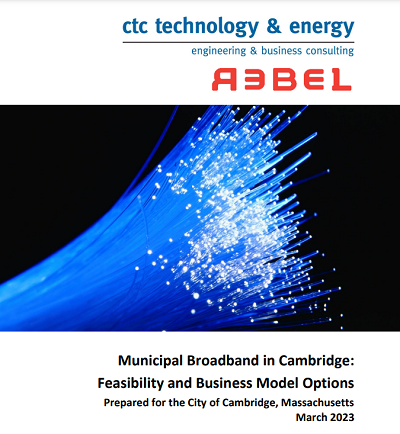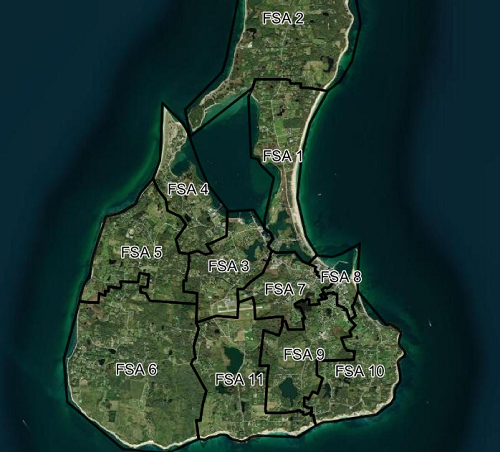
Fast, affordable Internet access for all.

In Cambridge, Massachusetts, digital equity advocates and city leaders have been debating the idea of building a citywide municipal fiber network for years now, mostly over whether the estimated $150 to $200 million it would cost to build the network would be worth it.
In a tech-savvy city, home to Harvard and MIT, the former city manager was resistant to a serious inquiry into municipal broadband. He retired last summer. But before he left, he relented on the broadband question – under pressure from city councilors and a local citizen group advocating for municipal broadband, Upgrade Cambridge.

With many residents weary of being held hostage to the whims and high cost of service from the monopoly provider in town (Comcast), which currently controls 80 percent of the city’s market, in 2021 the city hired the well-regarded Maryland-based consulting firm CTC Technology & Energy to conduct a thorough feasibility study. Now, with a new supportive city manager in office, city leaders have agreed to continue to investigate the options laid out in the recently published study.
‘Significant Public Support’ Even If It Requires Tax Money
After decades of frustration, Block Island residents are finally getting access to affordable, next-generation broadband. The Island’s freshly-launched BroadbandBI fiber network is not only utterly transformative for island residents, it’s the first municipal owned and operated broadband network in Rhode Island history.
The first wave of island residents were able to sign up for service in April; the beginning of a staggered deployment rollout island leaders say is very much on schedule. It’s a monumental occasion for the 1,410 island residents spread across nearly ten square miles, who’ll be holding a June 5 event at the island’s Southeast Lighthouse to celebrate the long-awaited launch.
For years, island residents have had to make due with an underwhelming combination of spotty and aging Verizon DSL, or costly and heavily capped satellite broadband—assuming they could get broadband service at all. Private providers generally didn’t see investing in the island community as something worth their time or money.
Running 'A Bit Ahead'
Enter the Town of New Shoreham’s municipal broadband effort: an organic response to market failure, built on the backs of decades of frustration. A network that’s both on budget and on schedule, New Shoreham Land and Finance Director Amy Lewis told ILSR.

“We are running a bit ahead on FSA (fiber service area) openings at the moment and expect to have all subscribers installed and operational in the fall of 2023,” Lewis said.
Quincy, Massachusetts is moving full speed ahead on a long-percolating plan to bring faster and more reliable broadband to a community long neglected by regional telecom monopolies.
If successful, the resulting open access fiber network should dramatically boost competitive options in the city, driving down costs for what many view as an essential utility.
After five years of debate and planning, Quincy officials say they’re getting closer to launching a city owned open access fiber network that will provide a backbone for city services, as well as a major infusion of long overdue broadband competition citywide.
Quincy Ward 3 Councilor Ian Cain told ISLR that the city is planning to launch trial deployments in Merrymount and Quincy Point during the next few months. The city has long worked with Entrypoint networks as a technical consultant and project financial planner, and city officials are expecting an engineering and feasibility study from Tilson within a matter of weeks.
RFP Coming Soon
“We're intending to bring the request for financing before the council before the end of session, which is at the end of June,” Cain said.
"We'll be putting out an RFP for the open access component of the project soon as well. We hope to fund the project through the city council before the summer, and then ideally we would start construction in the fall."
The initial pilot project will be funded by a general obligation bond. City leaders stated Merrymount and Quincy Point were selected both with an eye on socioeconomic diversity, and because the city was certain they’d see a relatively high adoption rate.
"Quincy Point in particular has a lot of economic and cultural diversity, and I think that's really important to emphasize as we move forward," Ward 2 City Councilor Anthony Andronico said of the city’s effort. "Quincy Point and Merrymount will have an opportunity to see what works with this program, what we can improve upon and help expand it to the whole city.”
The NTIA (National Telecommunications and Information Administration) insists that the 17 state laws that hamper nationwide community broadband deployments won’t delay a massive looming infusion of infrastructure broadband subsidies. But one industry group isn’t so sure.
BroadbandNow, a website dedicated to tracking the U.S. broadband industry, issued a report claiming that state restrictions on community broadband networks could delay the delivery of more than $42.45 billion in BEAD (Broadband Equity, Access and Deployment) grants made possible by the recently-passed Infrastructure Investment and Jobs Act (IIJA).
Such bills, often ghost written by the telecom industry by policy and lobbying intermediaries, often limit the construction or financing of community broadband networks, even in unserved areas that regional telecom monopolies have long neglected.
Covid’s home education and telecommuting boom highlighted the restrictive and often counterproductive nature of such bills, leading two states — Arkansas and Washington — to remove the barriers. And in Colorado earlier this month, Gov. Jared Polis signed Senate Bill 23-183 into law that eliminates an older 2005 law backed by regional telecom monopolies, which imposed cumbersome and onerous restrictions on Colorado towns and cities looking to build better, more affordable community-owned and operated broadband networks.
Colorado state leaders have voted to eliminate long-criticized state barriers to municipal broadband networks. Community broadband advocates hope it will be a beacon for other states eager to bring more reliable and affordable high-speed Internet service to a market long dominated by monopoly providers.
The Colorado decision, made after years of citizen backlash to the counterproductive restrictions, is the latest inflection point in a retreat away from monopoly-backed state laws stifling creative efforts to bridge the digital divide.
On May 1, Colorado Governor Jared Polis signed Senate Bill 23-183. The new law formally eliminates an older 2005 law backed by regional telecom monopolies, which imposed cumbersome and onerous restrictions on Colorado towns and cities looking to build better, more affordable community-owned and operated broadband networks.
“SB23-183 removes the biggest obstacle to achieving the Governor’s goal to connect 99% of Colorado households by the end of 2027,” Colorado Broadband Office Executive Director Brandy Reitter said of the decision. “Each local government is in a unique position or different phase of connecting residents to high-speed internet, and this bill allows them to establish broadband plans that meet the needs of their communities.”
Colorado state leaders say the repeal puts them in a prime position to capitalize on numerous digital equity programs designed to address Colorado’s digital divide, as well as the more than $42 billion in broadband subsidies soon to be distributed courtesy of the recently-passed Infrastructure Investment and Jobs Act (IIJA).
“With large amounts of federal funding coming from the IIJA bill, we wanted communities to be ready to receive this money,” Colorado Representative Brianna Titone told ILSR.
Last year, Governor Polis signed an executive order formally setting a goal of connecting 99% of Colorado households by the end of 2027. Colorado state leaders have previously stated they expect their share of IIJA/BEAD funding to be between $400 and $700 million; money that can now be used more broadly on a diverse array of creative broadband solutions.
Two months after President Biden’s belated and long-stalled Federal Communications Commission (FCC) nominee withdrew her nomination after a year-long attack campaign against her, today at the Broadband Communities Summit in Houston, Texas, Gigi Sohn announced her next move: Sohn will serve as the first Executive Director for the American Association of Public Broadband (AAPB).
A non-profit organization formed by a group of municipal officials, AAPB’s mission is to advance advocacy efforts on behalf of publicly-owned, locally-controlled broadband networks. Since the organization first announced its formation at the Broadband Communities Summit in May of 2022, it has been working to educate federal and state policymakers who “have turned to the telecom lobby for help and are receiving biased guidance” on the community broadband networks approach, just as $42.5 billion from the Infrastructure Investment and Jobs Act (IIJA) is set to flow to state governments to expand high-speed Internet access this summer.
During a keynote luncheon at the summit, Sohn was joined by AAPB founding board members Bob Knight and Kimberly McKinley on the main stage for a candid discussion in which she reflected on the state of Internet access in the U.S. and her experience that led to her to withdraw her nomination to the FCC. Near the end of the luncheon she announced her new role with AAPB, which was greeted by a standing ovation from the hundreds of attendees in the audience.
Freedom to Choose Community Broadband Future
The announcement was followed by a press briefing where she elaborated on her vision for AAPB.
“I will be the first Executive Director of the American Association of Public Broadband. Until now, there has not been a membership-based advocacy organization that works to ensure that public broadband can grow unimpeded by anti-competitive barriers. That’s despite the success of public broadband to help places like Chattanooga and the Massachusetts Berkshires transform from sleepy hamlets to vibrant centers of economic opportunity, education and culture,” she said at the press briefing.
The Cleveland, Tennessee city council has approved the creation of the Cleveland Utilities Authority, the first step in allowing the city-owned utility to get into the broadband business. The goal: improve utilities services and provide city residents with faster, cheaper, and more reliable fiber access after years of neglect by often-apathetic regional telecom monopolies.
The plan, approved by the city council with a 7-2 vote (see full video here), paves the way for Cleveland’s city-owned utility, Cleveland Utilities, to begin deployment of a $72 million fiber network. The city’s plan, documented in detail here, is heavily inspired by the successes seen by Chattanooga, Tennessee’s publicly-owned utility, EPB.
Of the initial $72 million investment, $64 million will be funded by public-issued debt, and go towards construction of the network, which Cleveland Utilities states should begin in March of 2024 and be completed in “roughly two to three years” barring complications.

An additional interdivisional loan of $8 Million will fund three years of operation for the new division. The utility’s plan is based on a 30 percent take rate, and aims to become cash flow positive between years 2-3, with all debt paid between years 10 and 12.
Once complete, the network will dramatically upgrade the utility’s energy monitoring and maintenance capabilities and deliver symmetrical fiber at speeds of 1 gigabit per second (Gbps) to local residents, and 10 Gbps to local area businesses.
*This piece was authored by Brieana Reed-Harmel, manager of the municipal-owned Pulse fiber network in Loveland, Colorado. It was originally published by Broadband Breakfast with permission to republish here. We have extensively covered the Pulse network in Loveland examples of which can be found here and here.
***
I am the manager for Pulse, the municipally owned broadband utility in Loveland and parts of Larimer County, Colorado. We made strong choices early on that put us on a path to success.
Having broken ground fewer than six months before the start of the pandemic, I am continually impressed with how smoothly our work has progressed. Put simply, I want you to be as successful as we have been.
Define the Plan, Assess Your Skills and Determine What You Need
Documenting the plan makes it easy to share the vision. The plan needs to include the high-level vision and strategy, but also delve into the granular, tactical details as it establishes your success criteria. What does success look like in terms of customer take rate, time to rollout and network documentation?
Include details related to long-term maintenance, and what operations will eventually look like as it will affect the network design, construction methods and the type of materials you decide to use. Understanding these details can greatly change cost models, as some choices have lower upfront costs but higher longer term maintenance costs, and vice versa, which can make or break a business model.
Representing 26 towns across Massachusetts, from Cape Cod to Chelsea, an informal group of mostly town officials have formed the Massachusetts Broadband Coalition in search of a way out of a broken broadband market to ensure everyone in their individual communities has access to high-speed Internet.
The newly-formed coalition has recently started to meet monthly to share information about what kind of alternatives there might be, or could be, to the big cable monopoly provider in their towns.
Questioning Monopoly Rules Without Reinventing the Wheel
The coalition, which held its first meeting in January, was convened by Robert Espindola, Fairhaven Selectmen and the board’s liaison to the town’s broadband study committee. And though the coalition is “in its infant stages,” as Espindola recently shared with ILSR, one common theme has emerged from each participating member.
“No doubt the common theme is: there’s no competition,” he said. “That’s how it started in Fairhaven for us. When we were negotiating our (franchise) agreement with Comcast, people in the community were asking: ‘why can’t we get competition?’”
When we first came together it was really more just to learn from each other, what each community was doing. And we wanted to see if we could find ways to work more efficiently and not reinvent the wheel.
Indeed, communities across the nation have set out to tackle local connectivity challenges head-on with a community broadband approach without having to reinvent the wheel. Some have built, or are building locally-controlled, publicly-owned open-access fiber networks to create the conditions for competition. Other cities and towns are building, maintaining, and operating their own successful municipal broadband networks. While still others have opted to enter into a public-private partnership with an independent ISP to build out a community-wide network.
Public-Private Partnerships Come into Focus
Hoping to ensure it can actually spend its share of historic broadband funding, Montana lawmakers have tweaked the state’s restrictions on community broadband. However, experts say most of the state law’s pointless restrictions remain intact, undermining state efforts to bring affordable, next-generation broadband access to Montana residents.
Montana’s one of seventeen states that have passed laws banning or restricting municipal broadband networks. The bills are usually ghost written by telecom monopoly lawyers, and in many states either outright prohibit community-owned broadband networks, or are designed to make funding and expanding such networks untenable.
Montana’s specific law, Mon. Code Ann. § 2-17-603, only allow municipalities to build and deliver broadband alternatives if there are no other private companies offering broadband within the municipality’s jurisdiction, or if the municipality can offer “advanced services” that are not available from incumbents.
Covid home schooling and telecommuting needs highlighted the counterproductive nature of such restrictions, driving some states—such as Arkansas and Washington—to dramatically roll back their restrictions.